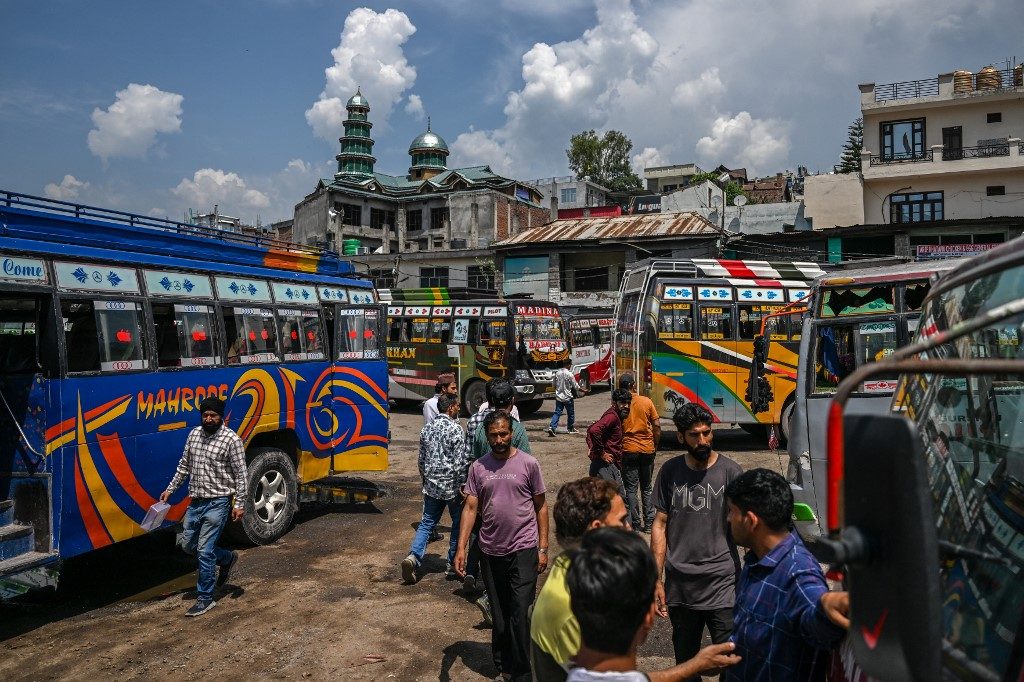
POONCH (India) – A ceasefire appeared to hold on Sunday between India and Pakistan, hours after the nuclear-armed rivals accused each other of violating a truce that brought them back from the brink of all-out war.
The ceasefire was agreed on Saturday after four days of missile, drone and artillery attacks which killed at least 60 people and sent thousands fleeing, in the worst violence since India and Pakistan’s last open conflict in 1999.
The “full and immediate” halt to hostilities was unexpectedly announced by US President Donald Trump on social media, who said that it followed a “long night of talks mediated by the United States”.
Early on Sunday India’s foreign secretary said that New Delhi had retaliated after Pakistan’s “repeated violations” of the truce.
Pakistan said it “remains committed” to the ceasefire and that its forces were handling violations by India with “responsibility and restraint”.
Residents of several villages along the Indian side of the Line of Control, the de-facto frontier of divided Kashmir, said heavy Pakistani shelling resumed hours after the ceasefire announcement.
Bairi Ram’s four-room house in the village of Kotmaira was reduced to rubble in shelling and three of his buffaloes were killed.
“Everything is finished,” he said.
‘Fragile peace’
But by later in the day a senior security official in Muzaffarabad in Pakistan administered-Kashmir said there were “intermittent exchanges of fire” but that situation was “quiet since the morning”.
Hazoor Sheikh, 46, who runs a store in the main market in the border town of Poonch, which was the worst-hit in India during the fighting, was one of the first to reopen his shop on Sunday.
“Finally, after days, we could sleep peacefully,” said Sheikh.
At least 12 Poonch residents were killed at most of the 60,000-strong population had fled in cars, on buses and even on foot.
On Sunday people were starting to come back, although some remained worried that the ceasefire would not last.
“Every time India has agreed to such an agreement, Pakistan has ended up violating it,” Poonch resident Hafiz Mohammad Shah Bukhari, 49, told AFP.
This was echoed on the other side by Kala Khan, who lives in Chakothi in Pakistan-controlled Kashmir and who hid with neighbours in a bunker.
“India is a deceitful neighbour. You can never trust it,” said Khan told AFP. “I have absolutely no faith in India; I believe it will strike again.”
Praveen Donthi, a senior analyst with the International Crisis Group, was also sceptical.
“Things are going to remain hostile. Things are going to be difficult,” he said.
Pro-military rallies were held in cities across Pakistan on Sunday, with the country’s green and white flag draped from buildings and cars.
‘Terrorist camps’
The alarming spiral towards all-out conflict began before dawn on Wednesday, when India launched missile attacks destroying what it called “terrorist camps”.
This followed an attack on tourists in Indian-administered Kashmir on April 22 that killed 26 people and which India accused Pakistan of backing.
Pakistan firmly denied any involvement and called for an independent investigation.
Islamabad immediately responded to the strikes with heavy artillery fire and claimed to have downed five fighter jets — something India has not commented on — before it said it launched its own strikes on Indian cities on Saturday.
Militants have stepped up operations in Kashmir since 2019, when Indian Prime Minister Narendra Modi’s Hindu nationalist government revoked the region’s limited autonomy and took it under direct rule from New Delhi.
Divided Muslim-majority Kashmir is claimed in full by both countries, who have fought several wars over the territory since their independence from Britain in 1947.
‘Positive step’
Pakistan Prime Minister Shehbaz Sharif said on X that his country — which has long sought international mediation in Kashmir — “appreciates” the US intervention.
India has consistently opposed mediation, however, and observers were sceptical of the truce.
News of the ceasefire was met with relief from countries including Britain and Iran, as well as the United Nations.
China, which borders India and Pakistan, said it was “willing to continue playing a constructive role” and remained concerned with any escalation, according to state-run news agency Xinhua.
“The days ahead will be critical to see whether the ceasefire holds and gives way to relative normalcy,” read an editorial in Dawn, Pakistan’s leading English language newspaper.
“While foreign friends can certainly help create a conducive atmosphere, it is Islamabad and New Delhi that will have to do the heavy lifting themselves to secure peace.” –AFP
The post India, Pakistan ceasefire holds after early violations appeared first on The Malaysian Reserve.
